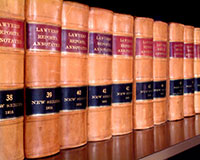How far can a local planning authority rely on legal professional privilege when asked to disclose environmental information? John Martin looks at a recent ruling on the issue
Key points
- The Environmental Information Regulations 2004 give a right of public access to information
- Legal professional privilege may, however, underpin an exception to the obligation of disclosure
The First-tier Tribunal, in Evans v The Information Commissioner [2015] UKFTT 2015 033 (GRC), has upheld a decision of the Information Commissioner (“the IC”) dated 19 January 2015 in which he concluded that a local planning authority (“LPA”) had been entitled to refuse to disclose certain information requested by the appellant under the provisions of the Environmental Information Regulations 2004 (“the regulations”). That information comprised correspondence passing between a solicitor in the LPA’s employment and various members of the LPA’s planning department.
In this, the solicitor gave advice on legal, procedural and evidential issues arising in relation to operational development carried out by the appellant on his land. It was not disputed that this information constituted “environmental information” for the purposes of the regulations.
The history
The appellant had carried out works of extension to his house, which the LPA advised him required planning permission. In 2011, he applied to the LPA for retrospective planning permission, which was refused. In 2012, he appealed to the secretary of state. That appeal was dismissed by an inspector, following an informal hearing. The LPA then began to consider whether to issue an enforcement notice.
In the meantime, differences of opinion arose between the appellant and the LPA on the precise scope and effect of the inspector’s appeal decision. The appellant also contended that the LPA’s original decision had contained errors, that the LPA had been inconsistent in its approach, that members of its planning department had been uncooperative and that bias had been shown against him.
Later in 2012, the appellant applied to the High Court to quash the inspector’s decision. Then, in March 2013, the appellant formally requested copies of the correspondence. The LPA disclosed some of the correspondence, but refused to disclose the remainder, claiming that it was the subject of legal professional privilege (“LPP”). It relied on the exception to disclosure provided for by regulation 12(5)(b) of the regulations.
The exception
In general terms, regulation 12(1) allows a public authority to refuse to disclose environmental information if an exception to disclosure applies under regulation 12(4) or 12(5), and in all the circumstances of the case, the public interest in maintaining the exception outweighs the public interest in disclosing the information.
The exception provided for by regulation 12(5)(b) relates to the disclosure of information to the extent that its disclosure would adversely affect “the course of justice, the ability of a person to receive a fair trial or the ability of a public authority to conduct an inquiry of a criminal or disciplinary nature”. In this context, “the course of justice” has a wide meaning, and guidance to public authorities advises claiming this exception in the case of materials covered by LPP.
(Put simply, LPP protects advice given in a professional capacity by a lawyer to a client, and confidential communications between them about that advice. The expression covers both legal advice privilege and litigation privilege. The latter is a wider concept than the former.)
The ruling
The tribunal took the view that all of the advice and assistance provided by the solicitor could properly be characterised as legal advice given in a professional capacity, so that the withheld information fell within the definition of legal advice privilege. However, it also went on to take the view that the withheld information was covered at the same time by litigation privilege. It then considered whether disclosure would have the adverse effect required to justify applying the exception in regulation 12(5)(b) of the regulations, noting that use of the word “would” meant that the adverse effect must be more probable than not.
The tribunal formed the view that disclosure would adversely affect the course of justice, in that the LPA would be placed at a considerable disadvantage in any litigation that ensued. Finally, the tribunal had regard to the public interest test, asking itself in all the circumstances of the case whether the public interest in maintaining the exception outweighed the public interest in disclosing the information.
It concluded that it did, noting that public interest of the kind that was sufficient to undermine the exception had to amount to more than mere curiosity as to what advice the LPA had received. There was considerable public interest in favour of maintaining LPP. It was a fundamental right at common law for any person or organisation to seek and receive legal advice and assistance in confidence.
What it means
The tribunal’s ruling will certainly strengthen the hand of any LPA faced with a similar request in like circumstances, for a number of reasons. It confirms that: (i) LPP may apply regardless of whether the professional legal advice is given by a member of staff or an external source; (ii) the process of appealing a planning decision could properly be characterised as “litigation” in this context; (iii) it is proper to look also at the ability of the LPA to deal with related complaints and criticism directed at it; and (iv) a public interest sufficient to determine this exception may involve demonstrating some form of misconduct on the part of the LPA.
John Martin is a planning law consultant








